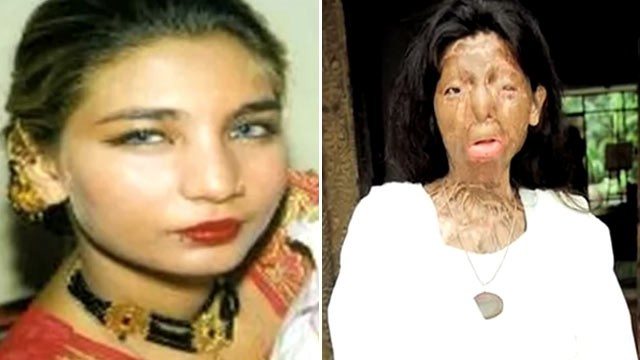Acid Attack Victim Fakhra Yunus Commits Suicide

A woman who became the disfigured face of the shunned and forgotten women of Pakistan committed suicide, jumping from her sixth floor apartment window in Italy last week.
Fakhra Yunus was only 22 when her husband of three years, Bilal Khar, a member of Pakistan's politically elite Khar family, allegedly threw acid on her face while she slept, the Asian Correspondent reported.
When Yunus and Khar met, she had been working as a prostitute, and the two soon married in 1998.
But almost immediately, Khar began abusing her, and Yunus suffered at his hands for nearly three years before she ran away, according to reports. Khar soon allegedly located and attacked her in 2000, but he has not been arrested and maintains his innocence.
The Washington Post noted that Yunus became the face of violence against women in the country after Pakistani activist Tehmina Durrani, author of "My Feudal Lord," helped Yunus escape to Rome and get treatment for her disfigurement. Durrani is known to speak out against the injustices women face in Muslim society. Over the years, Yunus underwent 38 facial reconstructive and plastic surgeries after the attack.
Durrani wrote of Yunus in The News Daily, "I have met many acid victims. Never have I seen one as completely disfigured as Fakhra. She had not just become faceless; her body had also melted to the bone. Despite her stark and hopeless condition, the government of the Islamic Republic of Pakistan was not in the least God-fearing. She was provided nothing...but disdain...and trashed."
Acid attacks are prevalent in certain parts of Asia. According to the New York Times' Nicholas D. Kristof, whoreported in 2008 that attacks were then at an all-time high in Pakistan, they are often the work of husbands who attack their wives as a form of revenge for refusing sexual advances or other proposals.
More than 7,000 deliberate burning attacks against women were recorded by the Progressive Women's Association of Pakistan in just two Pakistani towns between 1994 and 2008, according to Kristof's report. Only 2 percent of those cases were successfully prosecuted, he said.
Yunus' death came only a month after the documentary, "Saving Face," won an Academy Award for Best Documentary Short. The film, which chronicles the lives of women who have suffered such attacks, was said to have given Yunus hope for the future.
While plastic surgeons are continuously making strides to improve reconstructive plastic surgery procedures for victims like Yunus, it's difficult to imagine the emotional and psychological scars that remain, Dr. Malcolm Roth, president of the American Society of Plastic Surgeons, told ABCNews.com.
"Our face defines us, provides information about our age, gender, and ethnicity, and is central to communication and our recognition by others," said Roth. "Individuals that fall outside of appearance norms due to severe facial deformity or disfigurement often experience psychological suffering and social isolation. We can only hope that awareness of the impact of these heinous crimes and the devastating suffering for the victims will discourage such further acts."
Of Yunus' 38 reconstructive procedures, experts say plastic surgeons likely resurfaced her face with skin grafts or free flaps. Dr. Garry Brody, professor of plastic surgery at the University of Southern California, said plastic surgeons are able to take tissue from an unburned area of the body, stretch it out with a balloon, and then use one sheet to cover the entire face.
"The face's expression is largely diminished, but it's quite an improvement," said Brody. "The survival rate is high for the procedure."
Psychological treatment typically goes hand-in-hand with reconstructive surgery, Brody said. "It is usually a team approach."
Nevertheless, the psychological scars may remain, even if the physical scars have been mended.
In the Washington Post article on Yunus, Durrani quoted an Italian professor who assisted in Yunus' recovery, "I tried to mend her physical scars, but was unable to heal her soul."
Yunus' body was buried Sunday, according to News Daily, which also reported that she left a written message saying that she was committing suicide because of the silence and atrocities committed by Pakistani leaders.





No comments:
Post a Comment